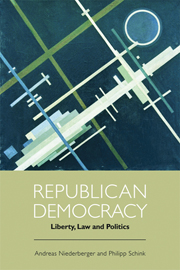Book contents
- Frontmatter
- Contents
- List of contributors
- Introduction
- 1 The Tension between Law and Politics in the Modern Republican Tradition
- 2 Impotence, Perspicuity and the Rule of Law: James Madison's Critique of Republican Legislation
- 3 Kant, Madison and the Problem of Transnational Order: Popular Sovereignty in Multilevel Systems
- 4 Republicanism and Democracy
- 5 Two Views of the City: Republicanism and Law
- 6 A Kantian Republican Conception of Justice as Nondomination
- 7 Two Republican Traditions
- 8 Freedom, Control and the State
- 9 Legal Modes and Democratic Citizens in Republican Theory
- 10 Rights, Republicanism and Democracy
- 11 Republicanism and Global Justice: A Sketch
- 12 Republicanism and Transnational Democracy
- Index
7 - Two Republican Traditions
Published online by Cambridge University Press: 05 October 2013
- Frontmatter
- Contents
- List of contributors
- Introduction
- 1 The Tension between Law and Politics in the Modern Republican Tradition
- 2 Impotence, Perspicuity and the Rule of Law: James Madison's Critique of Republican Legislation
- 3 Kant, Madison and the Problem of Transnational Order: Popular Sovereignty in Multilevel Systems
- 4 Republicanism and Democracy
- 5 Two Views of the City: Republicanism and Law
- 6 A Kantian Republican Conception of Justice as Nondomination
- 7 Two Republican Traditions
- 8 Freedom, Control and the State
- 9 Legal Modes and Democratic Citizens in Republican Theory
- 10 Rights, Republicanism and Democracy
- 11 Republicanism and Global Justice: A Sketch
- 12 Republicanism and Transnational Democracy
- Index
Summary
Recent exercises in the renewal of republican theory have focused on the Italian–Atlantic tradition of republicanism and on its demise with the rise of classical liberalism in the early nineteenth century. The focus on this tradition has been theoretically fruitful in generating a novel way of thinking about freedom and government in the contemporary world. But there is a distinct Franco–German tradition of republicanism, developed from the time of Rousseau and Kant, and it is important not to confuse this with the older way of thinking on which neo-republicans focus. My aim here is to reduce the risk of confusion by laying out the key differences between the two traditions and putting them in historical context. Inevitably I have to stylize the traditions I discuss but I hope that I do no serious injustice to the figures I address.
While Rousseau and Kant remained faithful to some core ideas in the Italian-Atlantic tradition of thinking – in particular, as we shall see, to the idea of freedom as nondomination – the way of thinking about citizens and the state that they ushered in was as inimical to the tradition as classical liberalism. Indeed, as liberalism came to displace traditional republican doctrine as the main ideology of the English-speaking world, the name “republicanism” came to designate the new Franco–German doctrine. It is primarily with this doctrine, rather than the Italian-Atlantic tradition, that critics of liberalism like Hannah Arendt (1958; 1973) and Michael Sandel (1996) identify, for example.
- Type
- Chapter
- Information
- Republican DemocracyLiberty, Law and Politics, pp. 169 - 204Publisher: Edinburgh University PressPrint publication year: 2013



